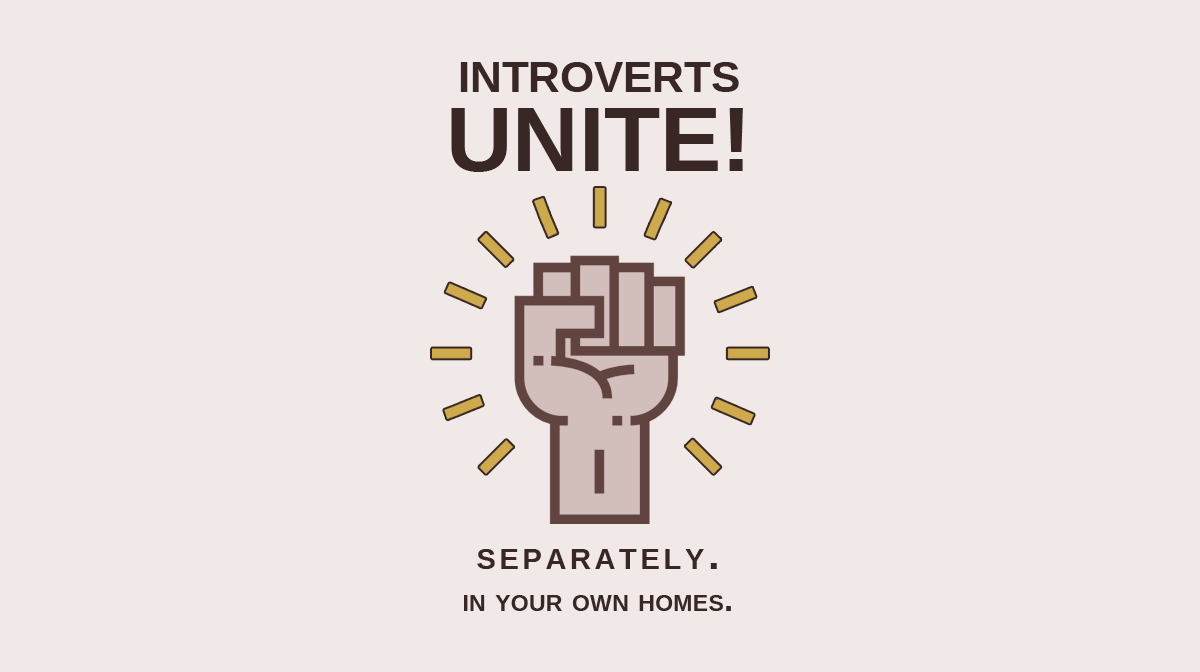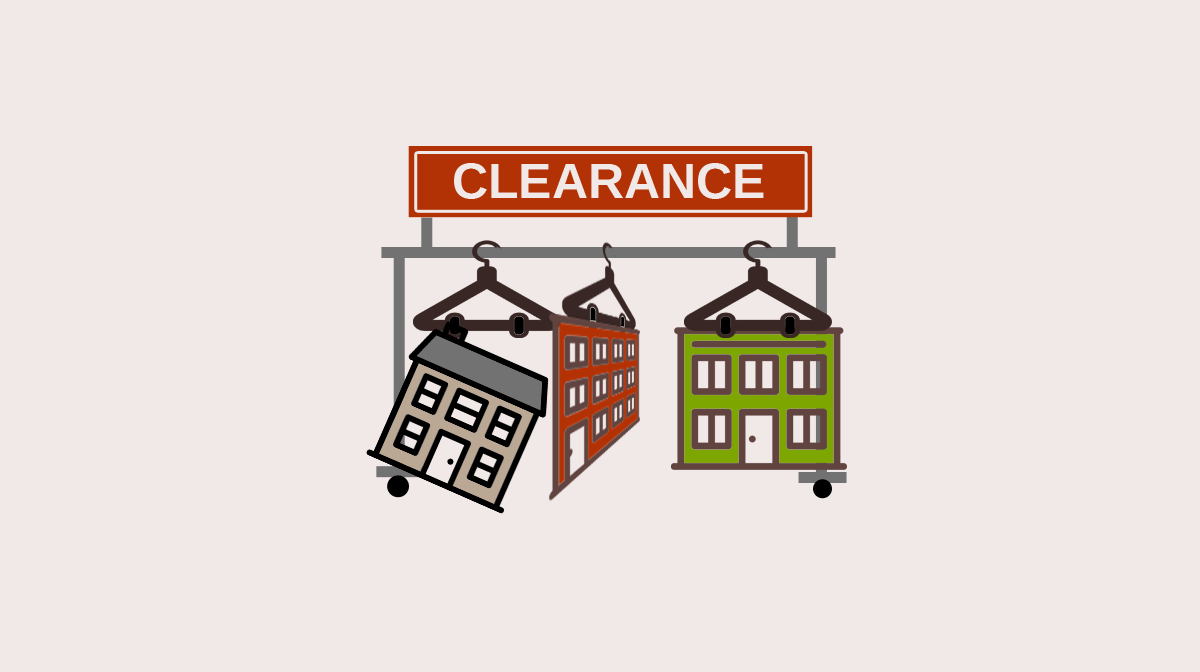Introversion has become something of a buzzword in recent years. There have been scads of articles, online support groups and even t-shirts for the introverted, a term which describes anywhere from 33 to 50% of the population.
Much like the often criticized use of "OCD" to refer to a need for aesthetic symmetry, the definition of "introversion" is fluid depending on its context. For some it's a clinical psychological assessment or a genetically inherited biological marker. For others it may be a means of self-description, an excuse or even an insult. Introverts may view their own status as a harmful thing or a trait that they can use to their benefit.
Given the many diverse meanings of introversion we cannot address every aspect of it, but we can make one general assumption: if you are an introvert in need of an apartment you're gonna have a tougher time than your extraverted companions.
For the purposes of this article we will be addressing the following grouped traits that seem to combine to form the classic introvert:
- They can get overstimulated and exhausted by too much social interaction.
- They prefer to have a few close friends rather than many acquaintances.
- They tend to internalize and deeply consider every alternative before they act.
- They are slow to trust others as they are prone to second-guessing and reading too much "between the lines."
Does this describe you? Then this article is for you. We're going to go over how to structure your search and what to look for in an apartment. As for all you extraverts out there, we're gonna need you to hit that share button and send this to the introverts in your social circle. You might not hear back from them, but they'll probably appreciate and remember the gesture.
Long search, firm deadline.
Introverts spend a lot of time thinking things over before acting. They may want to ensure every public action is a perfect action. This can lead to decision paralysis and fixating on small and unimportant details. Apartment hunting requires the renter to be able to make fast decisions, especially in competitive markets like Chicago where the first application in the pile is most likely to get the best apartment.
To counteract this, you should start browsing early, even 3-4 months before your intended move date, solely to get a sense of what's out there. Use these no-pressure showings to make your spreadsheets, practice your questions and establish a baseline of what you want in a new apartment.
In order to keep yourself from panicking over all the many options out there, you will also want to set one weekend as your deadline. The apartments you will choose from will be restricted only to the ones you view during that weekend, and you must force yourself to pick and apply for your top two or three choices by the end of that weekend. Remember, introvert, this is not about finding the best apartment in the world. You will not be graded on your apartment hunting ability by any outside forces. This is about finding the best out of the available options at the time of your search.
PS: The detail-oriented introvert renter will probably love our apartment safety reports. When you get to crunch time consider ordering one for every apartment you plan to view!
Open Houses are Your Friend.
Many introverts will think of an "open house" and picture huge crowds of people. They may also think that open houses are just for buyers, not renters. The truth is, a residence is a residence, regardless of whether it's intended for a renter or a buyer. The concept of the rental open house is also becoming quite popular in Chicago in recent years. If you've not considered making open houses part of your apartment search, here's some things to consider:
- They are usually not as crowded as you'd think. At most there will be one or two other groups at the event at the same time as you.
- They are usually staffed by newer agents who may be able to become your agent in your apartment search.
- You can use comparative attendance at various open houses to see which places get the most competition.
- You can get an idea of the various features available at different price points - these features will probably be mirrored in miniature in apartments.
- At an open house you can observe and ponder at your own pace without taking up the time of an agent while you're still in the "just browsing" phase of your search.
- Agents may try to hurry you through common areas at actual showings. At an open house you can usually make your way through the building to the unit in question at your own pace, allowing you to observe upkeep of common areas as well as security features.
In Chicago, public open houses tend to occur on Sundays in the late morning and early afternoon, with a few popular buildings also holding them on Saturdays. There are sometimes also Brokers' Open Houses on Tuesday mornings - these are intended for industry members but most agents will not turn away a member of the public that wants to attend.
There are two ways to trawl open houses. You can walk around neighborhoods looking for signs on the weekends, or if you want to plan your itinerary you can visit the website of any real estate brokerage (except Redfin) or a listing aggregator like Zillow during the week before and search for them. It's a nice idea to RSVP with the hosting agent if you plan on attending an open house, but if you're just browsing it's far from a mandatory thing.
Use an agent, but not too early.
It will be easier for an introvert to establish a strong, trusted connection with one good agent than it will be for them to call landlord after landlord, setting up showings and negotiating leases. Agents tend to be extraverts so they may find your preferences to be somewhat alien, but this shouldn't stop a good agent from helping you in the areas where you need it the most.
Find yourself a solid, experienced agent and make them your BFF for your deadline weekend. Let them know your list of questions, your wants and your needs. Show them the spreadsheets you've assembled. Let them do all the stuff that requires human interaction.
However, remember that rental agents only get paid when you sign a lease, and their commission isn't too fabulous. Don't waste their time while you're still in the just browsing phase. Contact them about a week before your deadline and have them help you assemble a selection of choices for the final days of the search. Bear in mind that they cannot show you every apartment. You'll probably have to set up a few showings on your own, but for an introvert it's definitely better to have to set up three showings yourself than it is to set up 15 of them.
Sidenote: when working with a tenant's agent in Chicago sometimes you will be met at the building by the landlord or their agent, and other times your agent will just retrieve keys from a lockbox and let you in themselves. It is against the law for an agent to give you the keys and let you go on your own, but if you want to avoid as much interaction as possible you can ask your agent to focus on lockboxed listings.
Additional sidenote: In Chicago it's important to remember that an agent's duty to keep what you tell them confidential is only valid if they're representing YOU, or serving as dual agents. However, not every dual agent is necessarily good at keeping confidential things to him or herself. If you are working with any agent that has direct contact with the landlord, don't put yourself in a situation where your trust can be violated. Keep things like your maximum budget to yourself. Introverts should cover the specific nature of the relationship with any agent they speak with from day one, hour one, minute one.
Building Styles
You're probably expecting me to say that introverts should stay away from big high rise buildings with lots of community-oriented features like party rooms and health clubs. You would be wrong. While the introvert prefers to amuse themselves with solitary activities, it's a good and healthy thing for them to get out of the house on a regular basis. Speaking as an introvert myself, I would be more likely to go do things like exercise and chat with other people if I didn't have to go all the way outside to do so.
Big high rise communities also offer an advantage if you are an introvert with an extravert roommate. The extravert has common areas outside of the apartment to hold parties and get-togethers, allowing the introvert to retain a necessary measure of control over the actual living space.
That being said, high rises do tend to have smaller apartments. If you work from home as many introverts do, or you are a completely socially avoidant introvert who never wants to deal with people at all, you'll want to look for a smaller building without elevators or common areas. Favor balconies over shared porches. Opt for in-unit laundry over shared coin laundry in a basement room. Just remember that privacy is the most expensive luxury you can have in housing.
Apartment Features
While personal taste is always a factor in apartment searches, there are certain apartment styles that are better suited to the renting introvert.
- Studies have found that high ceilings lead to big picture thinking, while low ceilings facilitate focus on small details. Recent architecture trends have favored high ceilings but the introvert may find that a shorter room better enhances their natural strengths. That being said, if you're looking to offset your introversion a high ceiling could be just the ticket.
- Built in storage space for your books, movies, games and crafts is always a plus. Alternately, look for rooms with long uninterrupted stretches of wall against which you can stash your own shelving units.
- Avoid loft-style apartments. You'll want walls that stretch all the way from floor to ceiling and doors that you can close, with lots of clearly separated rooms.
- Avoid basement apartments - they tend to wreak havoc with your cell phone signal.
- If you're a work-from-home introvert, find a place with south facing windows that let in a good amount of light in a room that you will use regularly.
- Introverts are usually less likely to decorate for decorating's sake - no frou frou throw pillows and scattered picture frames with this lot. It's therefore important to find a space that looks good on its own without any help from the occupant. Vintage features like natural wood trim and French doors can help, as can uniquely-shaped rooms or spaces broken up by support beams. You'll see a lot of bland, white, cookie-cutter apartments out there. Leave them for the extraverts.
Choosing a Landlord
Given the introvert's issues with trust and social interaction, the choice of landlord or property manager is pretty important. You want the people who control your apartment's maintenance to be available when you need them, but not constantly inserting themselves into your life. You will want your point of contact to remain consistent throughout your stay, so a company with low turnover should be high on your list of wants. With all this in mind, here are some landlord business models to seek out and avoid.
Good:
- Buildings with doormen who double as security and point of contact.
- Companies with online maintenance requests and rent payments.
- Offsite landlords with a portfolio of at least 10 buildings.
- Landlords who live within an hour of the building.
Bad:
- Landlords who live in the building.
- Landlords who pay a personal visit to collect rent every month.
- Management offices staffed entirely by chipper twenty-somethings. Turnover rate will be way too high.
- Renting from family or a close friend. Introverts value their close friends too highly to strain the relationship in this way.
Introverts, we know you probably won't leave a comment, but give us a like if this was helpful. Extraverts, we're relying on you to help out your introverted brethren. Share, comment & like us to help spread the word!
RentConfident is a Chicago startup that provides renters with the in-depth information they need to choose safe apartments. Help us reach more renters! Like, Share and Retweet us!





